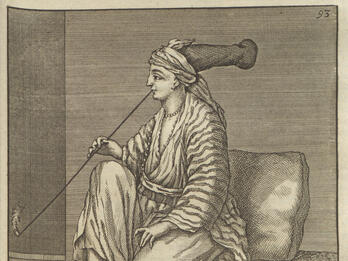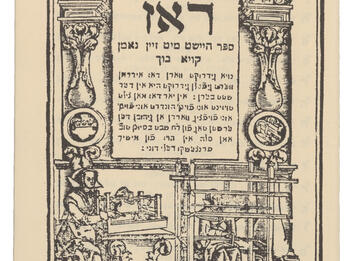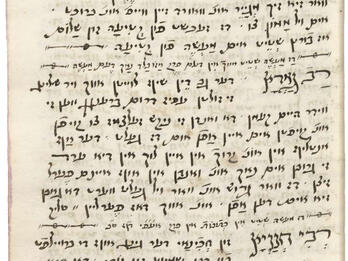A Tale of Mainz
Unknown
ca. 1520
The Two Half Brothers
I’ve been told that years ago a rich man lived in Mainz as a leader of the Jewish community. He had a beautiful wife, who, however, died, leaving him their son. A short time later, he took another wife and he had a son with her. The two half brothers were raised together as full brothers. They loved each other very much and…
A manuscript copied at the beginning of the sixteenth century, today found at Trinity College, Cambridge, contains the oldest-known written Yiddish folktales: three Yiddish tales concerning the German cities of Danzig, Mainz, and Worms. Combining Jewish themes with international folkloric motifs, the tale of Mainz tells the story of two half brothers competing to marry the most beautiful woman in Mainz. The two agree to travel for three years: at the end of that period, the richer brother will marry her. The younger, crafty brother steals his brother’s food and agrees to help his brother only if the latter will allow himself to be blinded. The younger brother then hurries home, declaring himself victorious. Yet his father insists on waiting until three years have passed. The older brother, miraculously healed, sets out on adventures, eventually becoming ruler of Mainz. He enters the city just before the wedding is to take place and, as the city’s ruler, demands to marry the bride. After the marriage, he reveals his identity to the city’s inhabitants. The story concludes with a moral: “No one should rely on his great cunning . . . for whatever God wills must be done.”
Related Guide
Early Modern Jewish Languages
As Ashkenazi and Sephardi Jews migrated eastward, Yiddish and Ladino emerged as distinct languages. Both languages developed literary traditions, as print became more widespread.

Related Guide
Early Modern Literature and the Arts
Jewish literary creativity flourished in the early modern period, dominated by Hebrew poetry that blended religious themes with Renaissance forms.
You may also like
Metsaḥ Aharon (Aaron’s Forehead)
Beri‘ah ve-Zimrah (Briyo and Zimro)

Ku-bukh (Book of Cows)

Mayse-bukh (Book of Stories)



